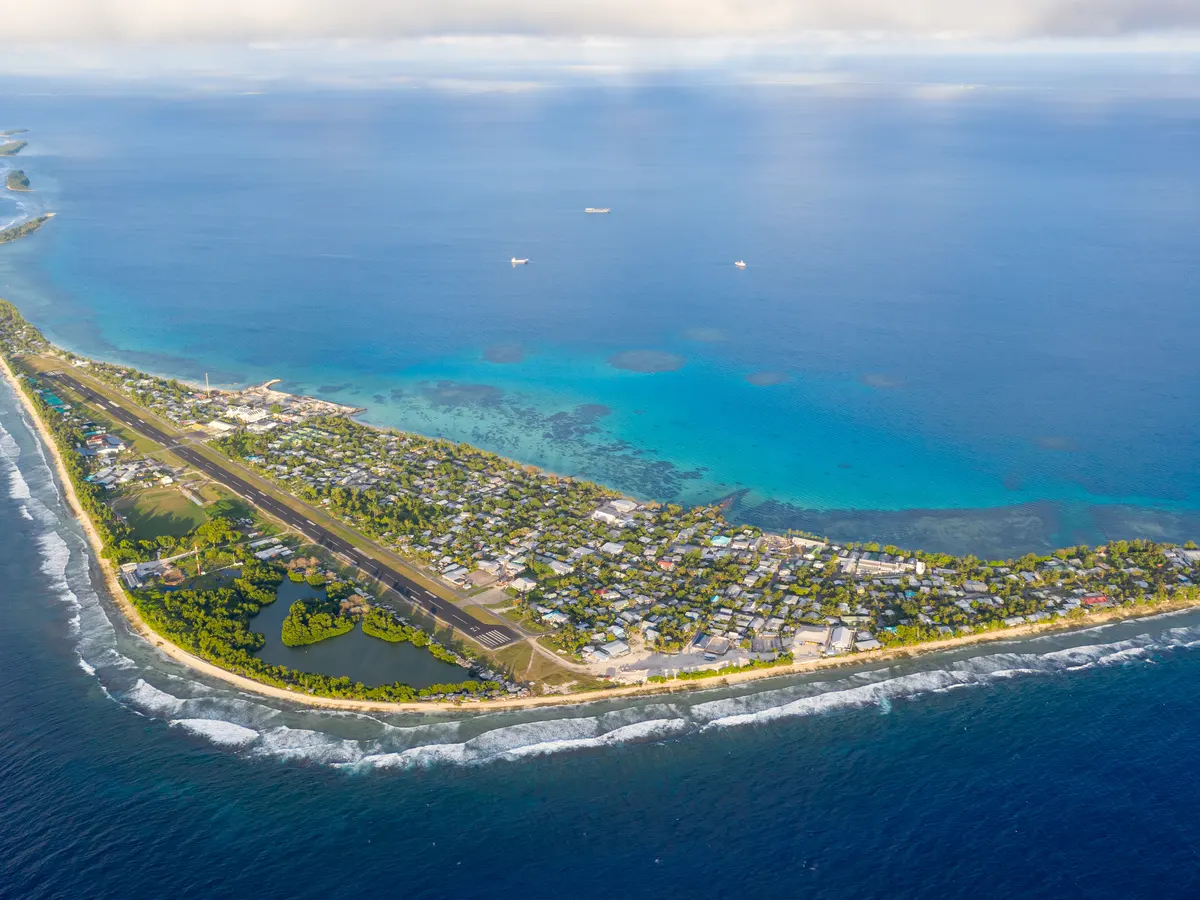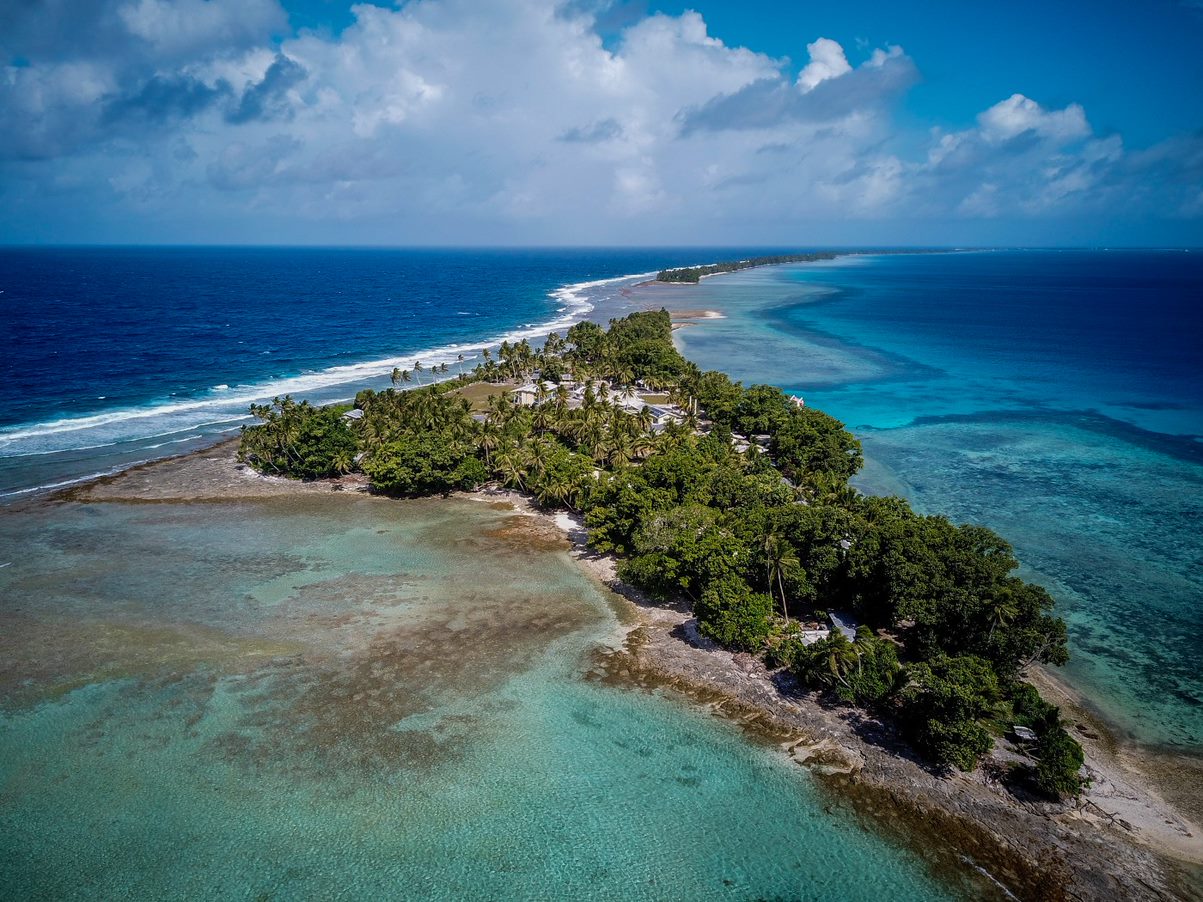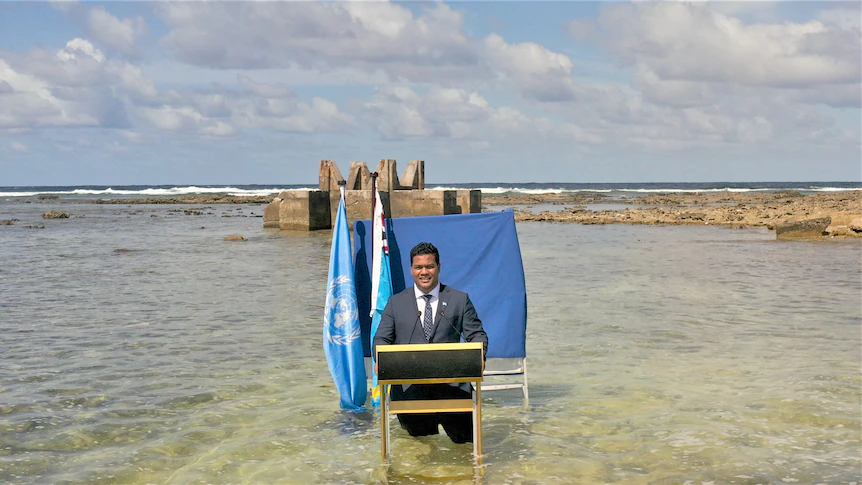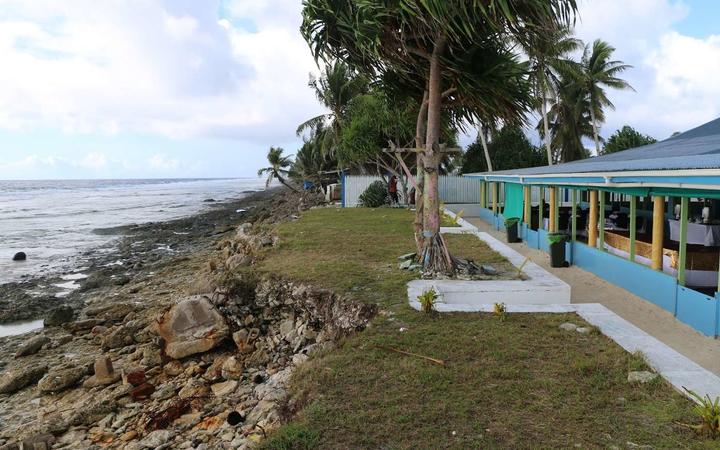Tuvalu says the impacts of climate change have forced it to create a digital copy of itself in the metaverse. But in the real world, not everyone’s convinced.
Tevaogali Elisala prefers spending time with children over adults.
The single mother and primary school teacher from Tuvalu’s capital Funafuti, admits occasionally they can be a “little headache” but Elisala sees it as her duty to “steer them in the right direction”.
She teaches cultural values of “olaga fakafenua” (communal living systems), “kaitasi” (shared responsibility) and “fale-pili” (being a good neighbour) to equip Tuvaluan children with the tools to care for their community and environment.
But behind the life lessons there is an undercurrent of profound uncertainty. Forces far away from their idyllic Pacific island are uprooting centuries of culture.
And all Elisala can do is try to help the children understand.
“They’re a little too young to fully realise the impact of what we’re trying to teach them,” Ms Elisala said.
“They won’t grow up with the things I’ve grown up with.
“It makes me mad and really, really sad.”
Tuvalu is on the frontline of the climate crisis.
Halfway between Australia and Hawaii, the country is made up of nine islands and low-lying atolls with its highest elevation about 4m above sea level. It means even modest sea level rises threaten not just to destroy arable land, but drown entire communities.
The threat of total evacuation in the decades to come is being treated as serious by the country’s leaders, with the UN describing the nation as being “on the extreme frontlines of the global climate emergency”.
Tuvalu’s Foreign Minister, Simon Kofe, unveiled a world-first response to this existential threat at the United Nations COP27 conference in Egypt in November last year.
Kofe delivered the speech virtually, standing inside a digital replica of Te Afualiku, an uninhabited islet on the atoll.
“As our land disappears, we have no choice but to become the world’s first digital nation,” he said.
“Our land, our ocean, our culture, are the most precious assets of our people.
“And to keep them safe from harm, no matter what happens in the physical world, we will move them to the cloud.”
The speech went viral, prompting a flurry of responses online.
But six months on from the fanfare, questions remain: was the metaverse idea a stunt to gain attention to Tuvalu’s plight?
Or is migrating the country online an actual reality facing its 12,000 people?
According to Kofe, they’re serious.
“Our country is, actually, preparing to move completely online, operating from cyberspace,” Kofe told the ABC.
“If we imagine in the future that Tuvaluans are [forced to relocate and] dispersed across the Earth, we would like to have a framework in place that ensures that the government can continue to function, coordinate itself and the people, manage our resources, our tuna industry, and our domain name,” he said.
Kofe argues Tuvalu needs a way to continue exercising its sovereignty as a nation, even if its land is lost.
“So you still have citizens that can vote, leaders can be elected into office, there can still be a cabinet of parliament,” he said.
“The key functions of a state is what we’re looking at migrating first, to ensure that we can operate remotely.”
Tuvalu’s digital twin will be hosted on the metaverse — a three-dimensional online virtual reality that tech experts believe could be the future of the internet.
This is the digital replica of Te Afualiku, a small islet of Tuvalu, created by referencing satellite imagery, drone footage and photos.
It is just a proof of concept at this stage and it is the only island in Tuvalu to be digitally rendered so far.
Questions about whether real people will be represented by avatars and how they will navigate the space remain unanswered.
Kofe said the government had not yet calculated how much the project would cost or how long it would take to complete.
“Since my speech at COP27, we’ve received a lot of interest from tech companies [showing] interest in supporting us,” he said.
“So I think funding [won’t] be an issue for us.”
Although Tuvalu’s circumstances are exceptional, the concept of digital nations or replicas is not new.
Similar technology is used in the manufacturing and automotive industries to digitally monitor and control things like production lines and engines.
And some governments are now experimenting in this space to create smart cities.
For example, Singapore, an island city state also combating the effects of rising sea levels, has created a digital twin of its entire country.
The digital twin is fed real time data on weather conditions and human movement to help city planners make informed decisions in the physical world.
In a scenario where the real-life Tuvalu could be saved, Mr Kofe said he hoped Tuvalu’s digital twin would exist alongside the physical one.
“Either way, we’re going to build a digital nation because it makes life much easier for us,” he said.
“And it ensures that we are ready whenever there is a disaster.
“I know we always like to think of climate change and sea level rise, but even a tsunami could literally wipe Tuvalu out.”
In the Pacific, where climate change has become an existential threat, the concept of keeping culture alive digitally is catching on.
Last year, some Pacific atoll nations such as Marshall Islands launched a global partnership to preserve cultures in the wake of climate change threats, which included creating an cultural “repository”.
And although the concept of creating an actual digital twin in the metaverse, as Tuvalu plans to do, has not been replicated by any other Pacific nations, the idea is gaining traction in some local communities.
In Vanuatu, the devastation caused by twin cyclones in March — which impacted an estimated 80 per cent of the population — led Flora Vano, the country manager for ActionAid Vanuatu, to call for action.
Vano, who saw the destruction in her country first hand, wants her government to invest in digital twin technology like Tuvalu has done.
“We might want to start recording our stories and transferring our Indigenous knowledge into soft copies or into digital technologies for our identity’s sake,” Vano said.
“As a mother, I would really love to see our government [retain] what we have, [like] Tuvalu has done.
“We don’t want to wait until it’s too late.”
The Vanuatu government declined to comment.
Nick Kelly, senior lecturer in interaction design at the Queensland University of Technology, said the concept of migrating entire nations online was not a “good direction for the human race”.
But he believed the concept of a digital future would become more common as the world “tries to figure out” what to do to with people dispossessed of their land due to climate change.
“I think there’s going to be a lot of experiments in this space,” Dr Kelly said.
“A cultural response to this social problem is likely to be much more productive than these technological responses.
“However, like anything, this is a tool that could be used for really good purposes and could become a positive part of our future.”
On the ground in Funafuti, the metaverse project is yet to gain traction, with many locals the ABC spoke to unaware of the details.
In vast areas of the country, such as its outer islands, mobile access is limited and internet access is still patchy — an area the government says it is investing in.
For father-of-two Hawaii Paeniu, the project sends the wrong message.
“It’s like people or leaders are already losing hope, but here we are still fighting and trying to reclaim land to prevent Tuvalu from sinking,” he said.
Paeniu’s family has lived in Tuvalu for 10 generations.
As a child growing up on Funafuti, he would play in the king tide with his friends, the ocean water lapping up to their knees.
“We didn’t realise how serious it was until we grew up,” he said.
Now an official within the Ministry of Health, he said he would do anything to keep his family safe and happy — including leaving his ancestral home.
But, he said, that would be their “last option”.
And even though he did not support the idea of “giving up” on Tuvalu, Paeniu accepted the digital nation could provide some sort of long-term identity for future generations.
“If that’s what’s really going to happen, [the digital nation] will bring back good old memories of Tuvalu, especially for my kids to know and learn the culture and tradition,” he said.
“But I think world leaders really do need to picture themselves in our shoes, so they can feel and know what we are experiencing, the reality of what’s happening here in my home country.
“We are humans, we are alive and are still fighting against climate change, we need actions to be implemented right away for the future of my country.”
“This is what I call paradise, and to leave my island and my culture and my people and my food — it’s not [going to happen].”
Pedro has seen the changes in her country — these days she’s unable to plant crops in her garden due to soil salinity.
She accepted the metaverse project might be necessary for future generations, but as a “Christian lady” it was hard for her to comprehend.
“To make another island so that we can visit on internet — no, I don’t agree with that,” she said.
“I strongly believe in God, [and] that Tuvalu will not sink.
“He will not leave us to swim on our own.”
In a nation such as Tuvalu, where 97 percent of the population are Christian, faith in divine intervention is common.
Like Pedro, many believe Tuvalu’s collective faith will guide it through.
Kofe admitted there was reluctance in the community to even consider leaving home — and hesitancy from some regarding the metaverse project — but said he was not taking any chances.
“It would be silly for us not to prepare, and I think as a responsible government, we need to ensure that we have a plan in place,” he said.
The digital nation is part of Tuvalu’s broader Future Now Project, the government’s survival manifesto, which aims to protect its statehood and prompt urgent international climate action.
Kofe said the concepts of Olaga fakafenua, Kaitasi, Fale-pili taught by teachers such as Elisala have been incorporated into the country’s foreign policy.
And he hoped the world would realise its ethical and moral obligation to act on climate change.
“It is sad on the one hand because you’re planning relocation and leaving your islands,” he said.
“But then on the other hand, there is great potential right now with technology to make life better for every Tuvaluan.”
Back in the classroom, Elisala says her year five students have shown an interest in the metaverse migration plan.
While Elisala has been unable to answer all her students’ questions about the project, she said she hoped, for their sake, it “wouldn’t come to that”.
“But we have to think realistically,” she said.
“If our fear does come true that we might have to leave, obviously we want to have a place where we can go to that holds everything dear to us from our culture, to our language, to everything,” she said.
This story was written by Hugo Hodge, originally published at ABC Pacific on 27 April 2023, reposted via PACNEWS.




